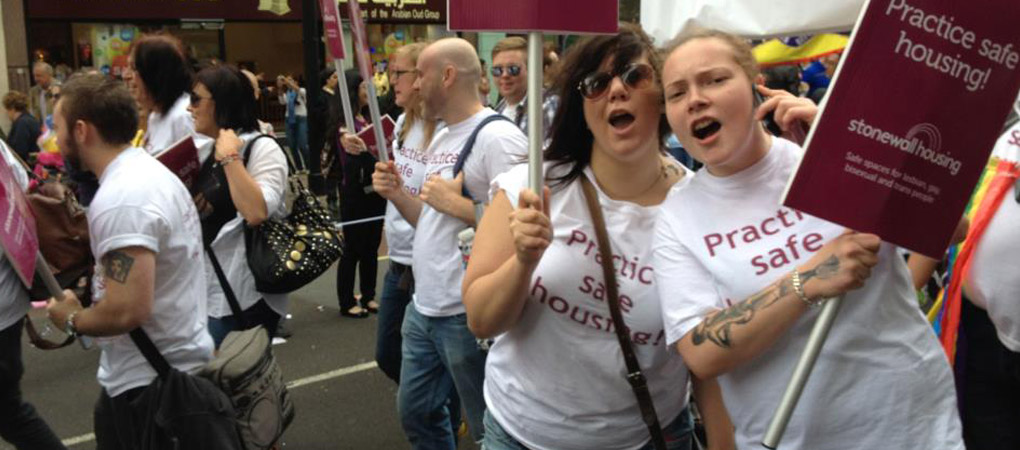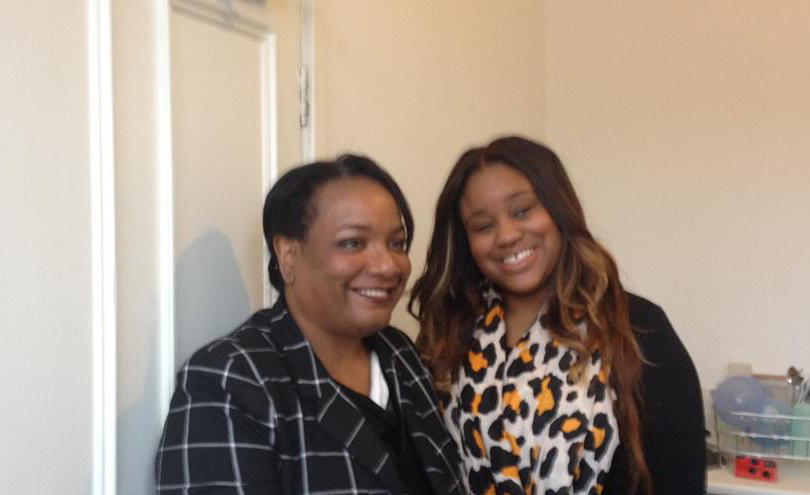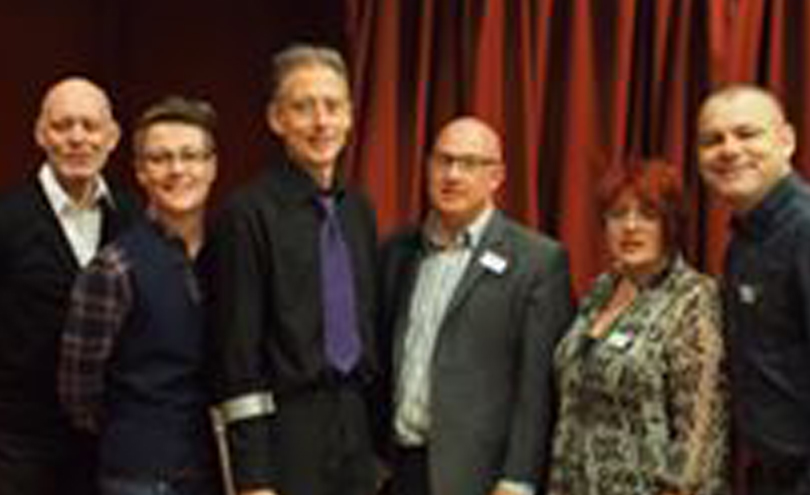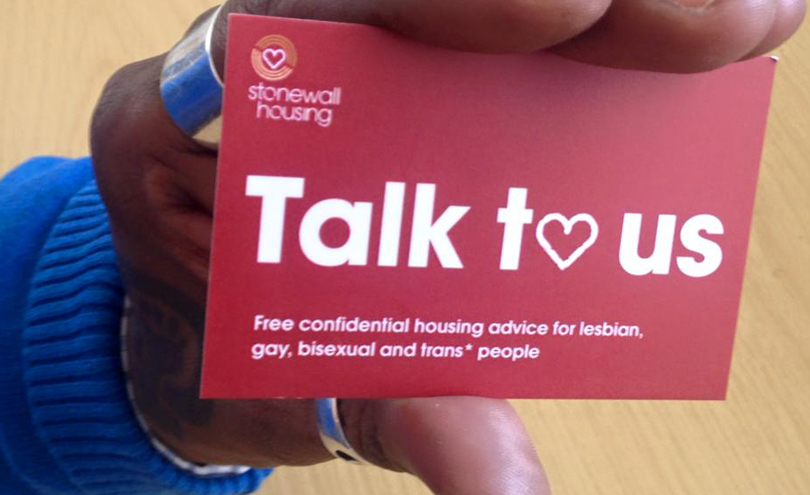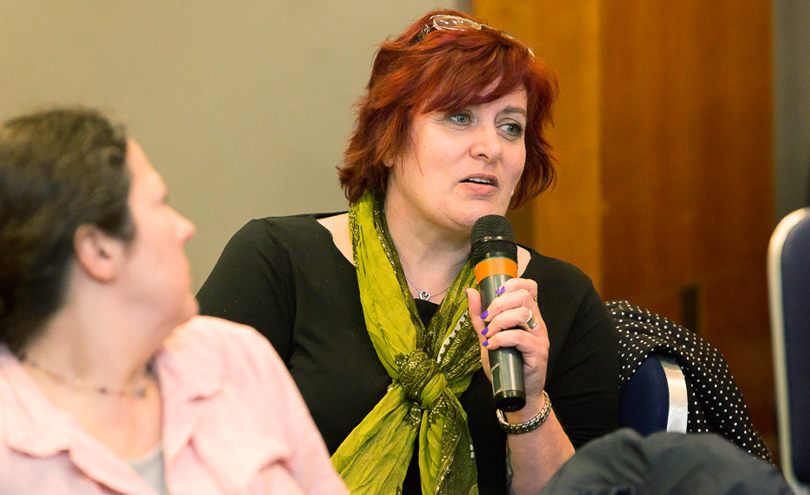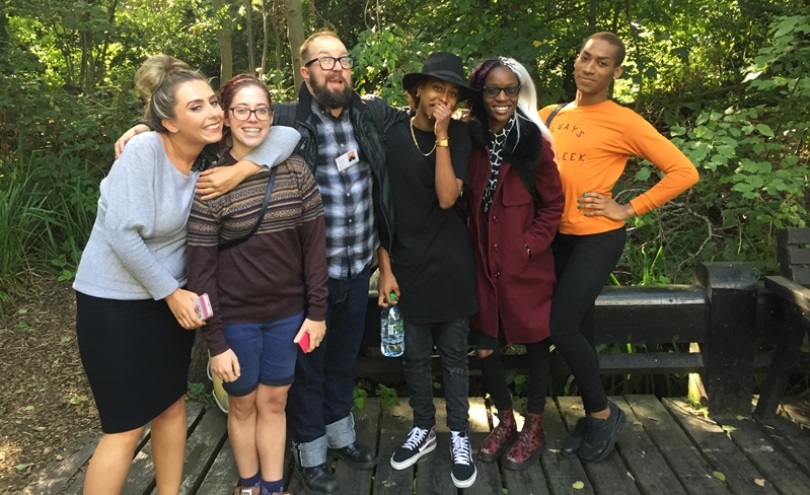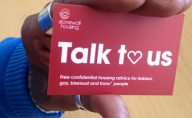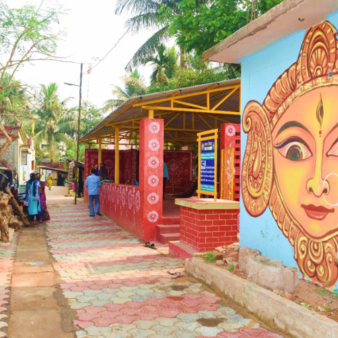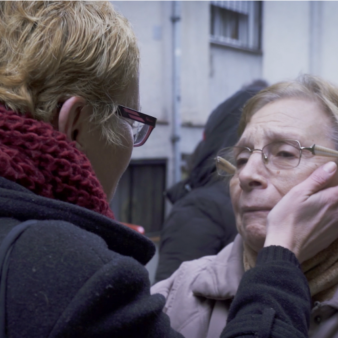Project Description
Stonewall Housing provides a voice for a community that are marginalised and frequently discriminated against in different housing settings. Their work is delivered through programmes tackling needs that range from:
- addressing overall barriers to LGBT people of all ages;
- supporting homeless LGBT people, in particular young people;
- making housing options more appropriate for older LGBT people;
- supporting victims of domestic abuse;
- improving conditions for LGBT migrants, asylum seekers and refugees.In addition, the training for practitioners which they deliver across England raises awareness of the needs of LGBT people in housing and care settings.
In 2014-2015, the Stonewall Housing advice and support team dealt with 1,344 beneficiaries, an increase from the previous year’s 1,175. The advice and support service delivered:
In addition to these services, Stonewall Housing supports LGBT people and organisations that are members of their LGBT Domestic Abuse Forum and Older LGBT Housing Network, which improves services for many more LGBT people through other agencies. The membership of these networks currently stands at over 1,200 contacts. Engagement via other channels also includes followers on social media and newsletter recipients, currently totaling over 5,000 people.
In 2014-15, Stonewall Housing also successfully housed 93 rough sleepers from across London. Rough sleepers may need support in applying to local councils if advice workers believe they will have a duty to house them in temporary accommodation. If not, then the advisor seeks to find them private or social rented housing.
Aims and Objectives
Stonewall Housing’s objectives are two-fold:
- For Stonewall Housing to provide support to LGBT people at an individual/community scale through projects that reduce the barriers to safe and secure housing due to people’s LGBT status.
- For the organisation’s work to lead to systemic/institutional changes which improve the housing environment for LGBT people in the long term, by providing advocacy for people that are marginalised by services which assume that people are heterosexual and [1]gender-conforming. Their clients cross all ages, ethnicities and backgrounds and range from teenagers thrown out of the family home for revealing their sexuality, to older people worried about living in a care home. Mainstream agencies could theoretically address these issues but in practice this does not happen and LGBT clients often feel safer approaching an issue-specific charity. Stonewall Housing aims to challenge these mainstream services to ensure that all LGBT people have safe spaces in which to live.
[1] Genderconforming = i.e. people whose gender identity is the same as the one they were assigned at birth.
Context
LGBT people in England have experienced significant improvements in terms of equality enshrined in the law and also in broader society since Stonewall Housing was founded 33 years ago but the need for their services remains strong.
In 2001, Stonewall Housing’s pioneering research into the housing needs of LGBT people, highlighted the stark lack of housing options for young LGBT people and the need for specialist housing services. The research found that young LGBT people are often discriminated against and face homo-/bi-/transphobia in housing settings. In addition, a disproportionate number of homeless people are estimated to be LGBT, accounting for about 24% of all homeless people under the age of 25. Trans people are particularly vulnerable in homelessness contexts, as they are subject to high rates of abuse.
The research also estimated that 90% of older LGBT people faced with decisions about care, moving into residential facilities or receiving care in their homes are reported to ‘go back into the closet’ due to feeling unsafe revealing their sexual orientation/gender identity. There is also a lack of services for men who are subjected to domestic violence by men, leading to higher risks for male victims of abuse of living in unsafe conditions or facing homelessness.
People claiming asylum due to the lack of safety for LGBT people in their home country are not provided LGBT-related help and support in state provided accommodation and are sometimes subject to homo/bi/transphobic abuse which typically remains unaddressed by the housing provider. This can lead them to surrender their state provided accommodation, without having the means to secure other options.
Key Features
The work of Stonewall Housing includes several strands of work to support the different needs of LGBT people in relation to housing. Some of this is delivered in London while other services have a national reach:
- Specialist advice and services to LGBT people of all ages through drop in centres and a phone line and case work. This work is funded by the local authority membership body ‘London Councils’ to benefit every London borough. However, people approach their advice and support services from across the UK and abroad and although Stonewall Housing isn’t able to provide casework outside London, they signpost to other organisations giving housing advice in those areas.
- Providing young LGBT tenants at risk with safe, secure housing in London, with 41 young LGBT people (16-25 years old) housed in six properties in four London boroughs and floating support for LGBT people who are over the age of 25. In 2015, Stonewall Housing opened two new houses with St. Mungo’s in Newham. In addition, the Jigsaw project supports young LGBT people to prevent youth homelessness and helps them access the services they need to secure accommodation and sustain tenancies, such as accommodation advice and support, education, training and employment, emotional and physical wellbeing.
- Supporting older people in several ways, including the older LGBT project which brings together housing providers, care and support agencies, community members and local authorities to have roundtable discussions and workshops about housing for older LGBT people through the National Older LGBT housing network, the training provided to professionals working with older people and the publication of a guide to help older LGBT people in housing need and a dedicated website outlining options and support for older LGBT people. The National Older LGBT housing network is currently operating in London, Brighton, Birmingham, Manchester and Leicester.
- Working on LGBT-specific domestic abuse and the links to unsafe home environments or risks of homelessness. This work is delivered through the Domestic Abuse Partnership, which works nationally, and the Refuge, Outreach, Action, Response (ROAR) project supporting LGBT Domestic abuse survivors in London.
- Collaborating with groups in London working with migrants, asylum seekers and refugees to address LGBT-specific issues, providing help to people in state-provided housing for asylum seekers who face abuse by other residents.
- At a national level, the organisation uses their experience, expertise and position in communities to advocate for and influence housing policy and investment and to produce reports and materials on LGBT housing issues.
- Stonewall Housing provides training to housing providers and other organisations across the UK to increase their knowledge of LGBT issues. This includes: Finding Safe Spaces (for organisations working with rough sleepers), Older LGBT awareness in a housing care and support setting, Generic LGBT Awareness in a housing context and LGBT domestic abuse.
To deliver these projects, Stonewall Housing works in partnership with other organisations as much as possible including statutory, voluntary and funding providers. They have collaborated with local authorities, The Prince’s Trust, the Equalities and Human Rights Commission and Race Equality Foundation, LGBT organisations, LGBT community groups and homelessness charities. These organisations have been involved in a number of ways such as jointly running projects such as the Domestic Abuse Partnership with Galop, Pace, Broken Rainbow[1], LGBT Switchboard and Stonewall Housing; Jigsaw with the Albert Kennedy Trust; LGBT health partnerships, working with the young people in supported housing with the Prince’s Trust and St Mungo’s.
[1] Pace and Broken Rainbow have both closed this year due to lack of sufficient funds
What impact has it had?
Stonewall Housing uses their experience, expertise and position in their communities to advocate for and influence housing policy and investment. For example, they have negotiated a new joint commission for their young people’s services which ensured they were not de-commissioned. Another borough decided not to decommission their specialist housing for LGBT people so that they could incorporate it into Stonewall Housing’s LGBT services. The organisation is currently in talks with Manchester and Leeds commissioners of housing services to develop the first housing projects for older LGBT people in the UK.
Their older people’s project is involved in creating a charter mark to have a long term impact on provision of housing and care for older LGBT people. This initiative is its planning stages and they are collaborating with a number of LGBT organisations nationally about delivering the charter mark with training and audits from communities in two pilot areas during 2016-17.
As part of the National LGBT Partnership they have contributed to two key strategic documents: the Adult Social Care Outcomes Framework LGBT Companion Document and the Race Equality Foundations ‘Dementia, Equity and Rights’ publication. These documents are targeted at commissioners and providers in order to improve services for LGBT people. The first of these publications was downloaded one hundred times a month during its first six months. They are working with the Department of Health and the Local Government Association in order to support local commissioners to consider the needs of LGBT people when they commission and deliver services locally.
How is it funded?
Initially, 33 years ago, Stonewall Housing was set up with a small grant from the Greater London Authority, since then they have been funded in a number of ways and now have a mix of funded projects, such as:
- the Older Persons’ project funded by Comic Relief;
- local authority funding support for the accommodation services;
- London Councils funding for the Advice Services. Other projects are supported by individual grants and these include organisations such as the Oak Foundation. Despite the difficult funding climate, they have retained contracts and attracted new funding from trusts and have complemented this through delivering training, trading and donations. At the start of 2015, their income reached its highest ever level (in 2007-8, income was £473,000 (USD $610,000) rising to £737,000 (USD $951,000) in 2014-15).Expenditure for 2014-15 can be broken down as follows, showing the cost of running each programme and the organisation as a whole:
|
Advice (General/ Youth/ Domestic Abuse) |
Support |
Projects/ Networks |
Training/ Research/ Development |
Total |
| Personnel |
£224,000 |
£216,000 |
£140,000 |
£21,000 |
£602,000 |
| Premises/ Equipment |
£13,000 |
£15,000 |
£29,000 |
£1,000 |
£58,000 |
| Administration |
£9,500 |
£10,000 |
£8,000 |
£1,000 |
£28,000 |
| Project Costs |
£16,000 |
£65,000 |
£20,000 |
£6,500 |
£108,000 |
| Fundraising/ Governance |
£0 |
£0 |
£0 |
£8,000 |
£8,000 |
| Total |
£262,500
(USD $341,000) |
£306,000
(USD $400,000) |
£197,000
(USD $256,000) |
£37,500
(USD $49,000) |
£804,000
(USD $1 million) |
Why is it innovative?
Stonewall Housing is the only specific LGBT housing support service in the UK. Mainstream agencies do not tend to have an in depth understanding of LGBT needs and how to make clients feel safe and accepted regarding their sexual orientation or gender identity, therefore might not make the most out of these services or avoid them altogether. What Stonewall Housing does is innovative in recognising these needs and supporting institutional change to improve the safety of LGBT people in the long term regarding housing-related matters.
Stonewall Housing has been responsible for a number of innovative projects including a project that challenged Forced Marriage, ROAR (a project that challenged domestic abuse), Finding Safe Spaces (a rough sleepers project) and specific LGBT housing-related training for organisations. They have also been involved in innovative joint projects using their unique position to inform projects such as an LGBT refugee support project ‘Over and Out’ and the Jigsaw youth project.
They are also different from other LGBT organisations as these tend to tackle single issues as opposed to trying to address a whole range of housing-related needs. Stonewall Housing aims to provide answers to any housing problem from any LGBT person. No other agency has developed guidance that identifies the housing and support needs for as many sections of LGBT communities in relation to housing, i.e. for groups that often experience double disadvantage (e.g. LGBT rough sleepers, LGBT asylum seekers or LGBT people who experience domestic abuse) because LGBT organisations often specialise in specific groups or needs.
What is the environmental impact?
Stonewall Housing recognises that day-to-day operations can impact both directly and indirectly on the environment. They aim to protect and improve the environment through practical measures, by adopting best practice wherever possible. They work to integrate environmental considerations into their business decisions and adopt greener alternatives wherever possible, throughout their services.
Stonewall Housing is a member of the Islington Sustainability Energy Partnership. While they do not own their office or the houses where they deliver support, they work with partners and contractors to reduce their environmental impact and review the impact during the Health and Safety audits which are carried out at all the venues where they work. They also provide training to their staff and clients on how they can consider the environmental impact of their homes.
Is it financially sustainable?
Stonewall Housing has diversified its income over recent years. It is derived from fees for consultancy and training services provided to housing associations. It has three contracts to provide services for young LGBT people in Hackney, Harringey and Islington. It also receives income from donations and has been successful in raising funds from charitable foundations including the National Lottery.
They successfully obtained funding from the UK Government’s Cabinet Office Local Sustainability Fund to receive expert advice on diversifying their services and partnering with the private sector. Business Unusual is a network of collaborators that work with the private, public and non-profit sectors and during 2016-17 they will be supporting Stonewall Housing to achieve organisational change through embedding commercial and non-commercial relationships with private sector organisations.
What is the social impact?
Stonewall Housing’s aim is clear: to ensure LGBT people and communities live in safer homes, free from fear and where they can celebrate their identity and support each other to achieve their full potential. To this end they make sure housing is affordable and accessible for all their communities and their projects focus on addressing social inequalities. They work to facilitate and enable their clients to stay engaged in wider society.
In the past five years, of the clients in their supported accommodation, 95% have had planned moves into more independent accommodation took, 94% reported better physical health and 86% improvements in their mental health and wellbeing, while 75% have achieved a reported improvement in their ability to manage their substance abuse.
The training they deliver is specifically designed to increase awareness of LGBT issues and to reduce inequalities between how LGBT and non-LGBT people experience housing services. Of those attending the older LGBT training for people that work in housing, homelessness and care services, 95% reported increased knowledge, which will hopefully have repercussions on how they deliver more equal services. Advice and support services help accommodated and homeless LGBT people in dealing with providers, local authorities and private landlords, particularly where their sexual orientation and gender identity is often not considered to be relevant. Stonewall Housing provides the tools to improve people’s access to housing without them being negatively affected by their LGBT status.
Feedback from clients is overwhelmingly positive. Some responses received during the year include: “I wanted to let you know that in my case your work has been lifesaving – you literally gave me the strength and hope to keep living and fighting for my right to be myself”.
Each person who contacts the advice service is asked to complete a short survey on whether the advice they received was beneficial. They also conduct an annual satisfaction survey about the services they deliver. While housing options are becoming more limited, Stonewall Housing works hard with private and social landlords and cooperatives to increase housing options for their clients. The majority of callers to the advice line are Black, Asian or from minority ethnic groups (BME). Over 1/3 reported having a disability, with 15% of advice clients stating that they had a mental health problem.
The need for safe, shared housing becomes more stark when other issues are considered along with a person’s sexual orientation and gender identity: Where are the safe spaces that BME LGBT or trans people without family support can achieve their potential? How do LGBT refugees feel safe when they are often placed with people that share their nationality but may be homophobic, bi-phobic or transphobic?
Stonewall Housing works to offer support contacts and peer support opportunities for people who cannot rely on their friends and family for help. Support work is built around developing a person’s resilience so that are able to move into their own accommodation with the networks they need. Support work also focuses on helping people develop the skills to live independently and support others by sharing skills and expertise in group support sessions. All this is done through the development of safe spaces, where risks and needs are assessed appropriately.
In terms of financial opportunities for clients, in supported accommodation, the evaluation process found that 92% of clients in the past five years have increased their income. This has been achieved in a variety of ways:
- Some clients contact Stonewall Housing because of their immediate financial hardship, hence they act as referral agents for vouchers for foodbanks across London as well as welfare grants, such as Terrence Higgins Trust Hardship Fund, London Catalyst Grant and they assist people to make grant and loan applications to other welfare grants. In 2014-15, Stonewall Housing assisted 27 clients to access £4,350 (USD $5,600) in additional welfare payments.
- All contacts who require ongoing advice, advocacy or support are allocated a specific caseworker and they work with their clients to tackle a range of support needs. Stonewall Housing staff establish if the person is in receipt of the correct benefits, support them to access employment, education or training that will increase their income and assist them to access Rent Deposit Bond Schemes.
Barriers
As a third sector organisation, Stonewall Housing works in an environment that is often subject to influences from central and local government. In the current climate of austerity and reduced funding it is important for the organisation to maintain its profile. The difficult funding climate has been a barrier to creating new services and ensuring continual provision for existing ones. Nonetheless, they have retained contracts and attracted new funding from trusts and through training and donations.
The organisation still faces barriers from commissioners and providers who believe that there is no need for LGBT-specific services or housing. Yet, sexual orientation and gender identity can be central to how LGBT people experience housing and homelessness. The approach that Stonewall Housing takes is to point out that LGBT people want choice. Some LGBT people will want specific services from organisations run by and for their communities while others will want to access services from mainstream organisations, hence they provide guidance and training so that they can improve what they deliver and be more inclusive.
Lessons Learned
Stonewall Housing aims to learn lessons from all of their projects, adapting their approach as a result. One key lesson is the importance of mainstream services taking a very explicit stance on the acceptance of LGBT people. This is demonstrated, for example, by having signs that indicate that the services provided are LGBT-friendly or by clearly providing the opportunity for people to discuss their LGBT status and associated needs.
Monitoring equalities is also crucial and so far is not systematically undertaken by housing providers or homelessness organisations. This needs to be more than a ‘statistical exercise’ and service users need to be clear what follow up is available if they are interested in taking up LGBT-related support. In addition, lessons are continually learned from other LGBT housing organisations around the world. The CEO of Stonewall Housing has recently visited three cities in the USA to learn about housing projects specifically designed to welcome LGBT older people, and how planning for the needs of LGBT people can take shape and what impact it has on wellbeing. These projects are not exclusively for LGBT people – in part because this was not possible from a legislative perspective. Nonetheless, an interesting lesson was that the diversity of these housing solutions has proved to be a source of pride for these communities (for example, one of the housing projects’ is shared with residents from the Somali community). Stonewall Housing is now engaged in a feasibility study around housing for older LGBT people in the UK and aims to transfer some of these lessons learned.
After assessing how they support their clients, Stonewall Housing have adopted a way of working to incorporate learning based on the PIE model (psychologically informed environments) in order to ensure that their tenants receive the best holistic care available. Dutch organisation COC Nederlands were invited to share their experiences of implementing the Pink Passkey scheme in Holland, a precursor to the charter mark now in development in the UK. Age Concern Preston were already involved in writing a charter mark for older LGBT care and support and so Stonewall Housing have worked with them on creating and piloting the charter mark and the associated training. They are now in the process of training their own facilitators to deliver the project in Brighton.
Evaluation
Service users complete satisfaction surveys each year and these findings are reported to staff, clients and trustees and are included in the organisation’s annual report and show that over 95% of people would recommend the organisation’s services to others.
Stonewall Housing evaluate all of their training and use this to inform future developments.Projects are monitored and evaluated regularly internally and by their funders:
- Comic Relief (Older LGBT project)
- London Councils (advice services)
- Advice Quality, Assurance Mark (advice services)
- Oak Foundation (Domestic Abuse project)
- Royal Association for the Deaf (advice project)
- Haringey, Hackney, Islington and Newham borough councils (accommodation)
The monitoring and evaluation results and any issues raised are then used to inform and improve the services regularly. This helps shape the future direction of similar projects.
Recognition
The advice and support team has recently been awarded the Advice Quality Award. The Advice Quality Standard (AQS) is the quality mark for organisations that provide advice to the public on social welfare issues. Organisations that hold the standard have demonstrated that they are easily accessible, effectively managed and employ staff with the skills and knowledge to meet the needs of their clients. The AQS is owned by the Advice Services Alliance and is managed by a committee of individuals with expertise in quality and the advice sector.
London Youth Gateway, of which Stonewall Housing is one of the partners, received a commendation from the Andy Ludlow Awards in 2014-15.
The Older LGBT Housing Network won an inaugural Awesome Networks Award given by Inclusive Networks in 2015.
They were also awarded the following from the Ultimate Planet Community Awards:
- 2013 – LGBT Network/Forum of the Year – LGBT Domestic Violence Forum.
- 2014 – LGBT Network/Forum of the Year – Youth Group of the Year.
Stonewall Housing are often quoted in reports and have written a number of articles for leading media outlets such as the Guardian newspaper.
They have hosted visitors from COC Nederland, who run the Pink Passkey charter mark scheme in The Netherlands and are speaking at the first older LGBT seminar in Amsterdam in 2016.
Transfer
Stonewall Housing is interested in how their model of working with their community could be scaled up and they feel there is a need for their approach to be replicated in other geographical areas. They believe their advice team model of drop-in housing surgeries and advice work could be replicated wherever there was available funding and space and would be most successful in cities with large LGBT communities such as Brighton, Manchester and Birmingham, although there is a need in rural communities as well. Albert Kennedy Trust, who are one of the LGBT Jigsaw partners, provide support in Newcastle and Manchester. Stonewall Housing is in discussions with them and other LGBT charities in different cities to develop a wider pathway or network of housing-support services for LGBT people in different parts of London and different cities in the UK.
Their aim is to continue providing advice and support services across London and secure the future of their accommodation services. In addition they intend to expand their training and their older people’s network until England and Wales has a comprehensive network of groups.
Internationally, Stonewall Housing is engaged in dialogue with other LGBT organisations, mostly in Europe and in the US, although to date there has not been a transfer of the UK approach elsewhere.

